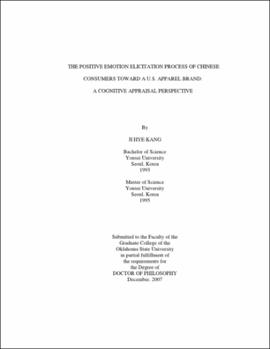| dc.contributor.advisor | Jin, Byoungho | |
| dc.contributor.author | Kang, Ji Hye | |
| dc.date.accessioned | 2013-11-26T08:23:22Z | |
| dc.date.available | 2013-11-26T08:23:22Z | |
| dc.date.issued | 2007-12 | |
| dc.identifier.uri | https://hdl.handle.net/11244/6699 | |
| dc.description.abstract | Scope and Method of Study: Despite the importance of China as a key export market for U.S businesses, the U.S. apparel industry has held a significant trade deficit with China for a long time. To reduce the trade deficit with China, U.S. apparel firms need to establish pertinent market strategies based on an understanding of Chinese consumers. To this end, this study aimed to examine the Chinese consumer emotion elicitation process toward a U.S. apparel brand. As a systematic approach, this study proposed a conceptual model employing the cognitive appraisal theory. This study posited that consumer global orientation (CGO) influences Chinese consumers' appraisals (relevance and congruence) of a U.S. apparel brand (Levi's), and through the appraisals, Chinese consumers elicit positive emotions toward the brand, resulting in purchase intentions of the brand. Data were collected using mall intercept surveys at shopping malls in Shanghai, Beijing and Guangzhou. | |
| dc.description.abstract | Findings and Conclusions: Among the proposed ten hypotheses in the research model, eight hypotheses were statistically significant. Of three antecedents of the consumer emotion elicitation process, two variables (exposure to global mass media and cultural openness) positively increased Chinese consumers' appraisals (relevance and congruence) of the U.S. apparel brand in a similar degree. Unlike these two antecedents (exposure to global mass media and cultural openness), the effects of exposure to mass migration on relevance and congruence were found to be insignificant. The independent relationships between appraisal dimensions and positive emotion were all supported. Another finding of this study is that the interaction effect of relevance and congruence on positive emotion was supported. Finally, this study confirmed that positive emotions increased Chinese consumers' purchase intentions of a U.S. apparel brand. Based on these findings, theoretical and managerial implications were discussed. | |
| dc.format | application/pdf | |
| dc.language | en_US | |
| dc.rights | Copyright is held by the author who has granted the Oklahoma State University Library the non-exclusive right to share this material in its institutional repository. Contact Digital Library Services at lib-dls@okstate.edu or 405-744-9161 for the permission policy on the use, reproduction or distribution of this material. | |
| dc.title | Positive emotion elicitation process of Chinese consumers toward a U.S. apparel brand: A cognitive appraisal perspective | |
| dc.contributor.committeeMember | Branson, Donna | |
| dc.contributor.committeeMember | Swinney, Jane Lowry | |
| dc.contributor.committeeMember | Gavin, Mark B. | |
| osu.filename | Kang_okstate_0664D_2567 | |
| osu.accesstype | Open Access | |
| dc.type.genre | Dissertation | |
| dc.type.material | Text | |
| thesis.degree.discipline | Design, Housing and Merchandising | |
| thesis.degree.grantor | Oklahoma State University | |
